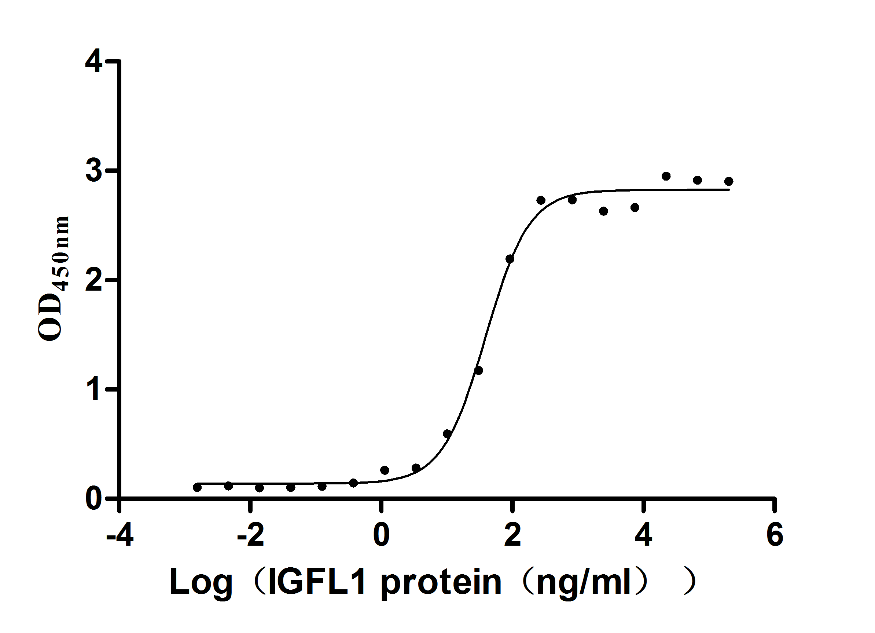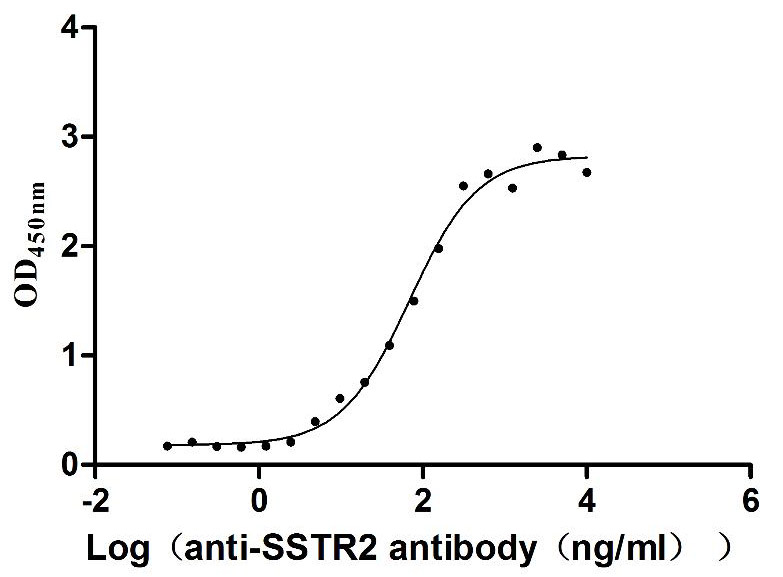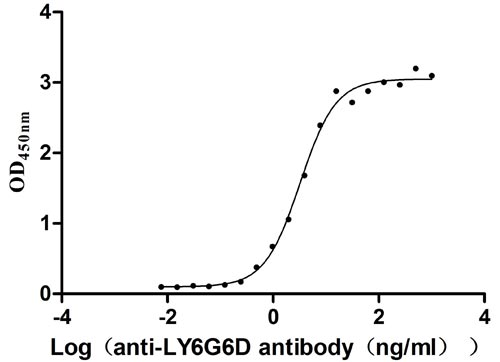Recombinant Mouse Chloride intracellular channel protein 5 (Clic5)
-
中文名稱:Recombinant Mouse Chloride intracellular channel protein 5(Clic5)
-
貨號(hào):CSB-CF806929MO
-
規(guī)格:
-
來(lái)源:in vitro E.coli expression system
-
其他:
產(chǎn)品詳情
-
基因名:Clic5
-
Uniprot No.:
-
別名:Clic5; Chloride intracellular channel protein 5
-
種屬:Mus musculus (Mouse)
-
蛋白長(zhǎng)度:full length protein
-
表達(dá)區(qū)域:1-251
-
氨基酸序列MTDSATTNGDDRDPEIELFVKAGIDGESIGNCPFSQRLFMILWLKGVVFNVTTVDLKRKP ADLHNLAPGTHPPFLTFNGDVKTDVNKIEEFLEETLTPEKYPKLAAKHRESNTAGIDIFS KFSAYIKNTKQQNNAALERGLTKALRKLDDYLNSPLPEEIDTNTHGDEKGSQRKFLDGDE LTLADCNLLPKLHVVKIVAKKYRNYDIPAEMTGLWRYLKNAYARDEFTNTCAADSEIELA YADVARRLSRS
Note: The complete sequence including tag sequence, target protein sequence and linker sequence could be provided upon request. -
蛋白標(biāo)簽:N-terminal 10xHis-tagged
-
產(chǎn)品提供形式:Liquid or Lyophilized powder
Note: We will preferentially ship the format that we have in stock, however, if you have any special requirement for the format, please remark your requirement when placing the order, we will prepare according to your demand. -
緩沖液:Lyophilized from Tris/PBS-based buffer, 6% Trehalose, pH 8.0
-
儲(chǔ)存條件:Store at -20°C/-80°C upon receipt, aliquoting is necessary for mutiple use. Avoid repeated freeze-thaw cycles.
-
保質(zhì)期:The shelf life is related to many factors, storage state, buffer ingredients, storage temperature and the stability of the protein itself.
Generally, the shelf life of liquid form is 6 months at -20°C/-80°C. The shelf life of lyophilized form is 12 months at -20°C/-80°C. -
貨期:Basically, we can dispatch the products out in 1-3 working days after receiving your orders. Delivery time may differ from different purchasing way or location, please kindly consult your local distributors for specific delivery time.Note: All of our proteins are default shipped with normal blue ice packs, if you request to ship with dry ice, please communicate with us in advance and extra fees will be charged.
-
注意事項(xiàng):Repeated freezing and thawing is not recommended. Store working aliquots at 4°C for up to one week.
-
Datasheet & COA:Please contact us to get it.
相關(guān)產(chǎn)品
靶點(diǎn)詳情
-
功能:Required for normal hearing. It is necessary for the formation of stereocilia in the inner ear and normal development of the organ of Corti. Can insert into membranes and form poorly selective ion channels that may also transport chloride ions. May play a role in the regulation of transepithelial ion absorption and secretion. Is required for the development and/or maintenance of the proper glomerular endothelial cell and podocyte architecture. Plays a role in formation of the lens suture in the eye, which is important for normal optical properties of the lens.
-
基因功能參考文獻(xiàn):
- These results suggest that KLPH is required for lens-specific expression of Clic5 and that Clic5 has an important role in the machinery that controls lens fiber cell extension and organization. PMID: 29425878
- Results indicate CLICs-dependent chloride efflux as an essential and proximal upstream event for NLRP3 activation. PMID: 28779175
- The findings indicate that CLIC4/CLIC5A-mediated ERM activation is required for maintenance of the glomerular capillary architecture. PMID: 27582103
- Augmented hypertension-induced glomerular capillary injury in mice lacking CLIC5 results from abrogation of Rac1-dependent Pak and ezrin activation, perhaps reducing the tensile strength of the podocyte actin cytoskeleton. PMID: 26924049
- The mechanism of CLIC5A action involves clustered plasma membrane phosphatidylinositol 4,5-bisphosphate accumulation, in turn facilitating ezrin activation and actin-dependent cell surface remodeling. PMID: 25344252
- Biochemical assays showed interaction of CLIC5 with ERM proteins, TPRN, and possibly myosin VI (MYO6). In addition, CLIC5 and RDX failed to localize normally in fused stereocilia of MYO6 mutant mice PMID: 24285636
- miR-96 and miR-182 regulate the in vivo expression of CLIC5 in mouse inner ear hair cells PMID: 22889583
- Study identifies CLIC5 as a new component that is enriched in and necessary for foot process integrity and podocyte function in vivo. PMID: 20664558
- CLIC5 disrupts proliferation of C2C12 cells and is involved in the differentiation of myoblasts by enhancing the protein expression level of MyHC, myogenin and desmin. PMID: 20055760
- Clic5 mutant mice are resistant to diet-induced obesity. PMID: 20357015
- CLIC5A colocalizes with ezrin and podocalyxin in podocytes and is required for the development/maintenance of the proper glomerular endothelial cell and podocyte architecture. PMID: 20335315
- CLIC5 associates with radixin in hair cell stereocilia and may help form or stabilize connections between the plasma membrane and the filamentous actin core. PMID: 17021174
顯示更多
收起更多
-
相關(guān)疾?。?/div>Defects in Clic5 are a cause of the jitterbug (jbg) phenotype. Jbg is the result of a spontaneous mutation that leads to severe degeneration of the organ of Corti in the inner ear. Jbg leads to progressive degeneration of inner ear hair cells. Affected mice are identified by head bobbing, circling behavior and their inability to swim. They cannot hear well when young, and become completely deaf after 5 months.亞細(xì)胞定位:Golgi apparatus. Cytoplasm, cytoskeleton, microtubule organizing center, centrosome. Cytoplasm, cytoskeleton. Cytoplasm, cell cortex. Membrane; Single-pass membrane protein. Apical cell membrane; Single-pass membrane protein. Cytoplasm.蛋白家族:Chloride channel CLIC family組織特異性:Detected in lung and inner ear. Detected in embryonic cochlea, on microvilli-covered apical surfaces of interdental cells, columnar cells of Kolliker's organ, and on stereocilia of inner and outer hair cells (at protein level). Also detected in the eye, w數(shù)據(jù)庫(kù)鏈接:
Most popular with customers
-
Recombinant Human Tumor necrosis factor ligand superfamily member 18 (TNFSF18), partial (Active)
Express system: Mammalian cell
Species: Homo sapiens (Human)
-
Recombinant Human IGF-like family receptor 1 (IGFLR1), partial (Active)
Express system: Mammalian cell
Species: Homo sapiens (Human)
-
Recombinant Human Somatostatin receptor type 2 (SSTR2)-VLPs (Active)
Express system: Mammalian cell
Species: Homo sapiens (Human)
-
Recombinant Macaca fascicularis CD93 molecule (CD93), partial (Active)
Express system: Mammalian cell
Species: Macaca fascicularis (Crab-eating macaque) (Cynomolgus monkey)
-
Recombinant Human Lymphocyte antigen 6 complex locus protein G6d (LY6G6D) (Active)
Express system: Yeast
Species: Homo sapiens (Human)
-
Recombinant Human Tumor-associated calcium signal transducer 2 (TACSTD2), partial (Active)
Express system: Mammalian cell
Species: Homo sapiens (Human)
-
Recombinant Human Alkaline phosphatase, germ cell type (ALPG) (Active)
Express system: Mammalian cell
Species: Homo sapiens (Human)
-
Recombinant Human Myosin regulatory light polypeptide 9 (MYL9) (Active)
Express system: Yeast
Species: Homo sapiens (Human)


















